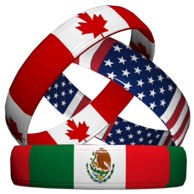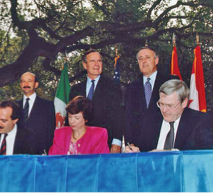Sign up for FlowVella
Sign up with FacebookAlready have an account? Sign in now
By registering you are agreeing to our
Terms of Service
Loading Flow


In 20 years After NAFTA, Christopher Wilson, an Associate who works at the Mexico Institue at Wilson Center, discusses the successes and controversy of NAFTA. According to Rob Sachs, the citizens of the Untied States and Mexico have had issues dealing with income inequality, the loss of manufacturing jobs, and poverty. Wilson explains that in Mexico, NAFTA had moved people to factory jobs. As a result, Mexico has world class companies, and has the fastest automanufacturers in the world. This also puts Mexico at a boost in the manufacturing section, while as the Untied States has a decline in manufacturing employment, driven by technology advancements. These advancements Sachs states on the additional stimulations such as allowing corporations to "skirt" environmental laws and leading to negative environmental factors.


NAFTA
In 1992, Mexico, the United States and Canada signed the North American Free Trade Agreement, otherwise known as NAFTA. This agreement increased the flow of goods, services, and people among these countries. As a result,it gradually reduced trade restrictions as well as the growing percentage of 10 to 15 percent among these three countries. Between Mexico and the United States, NAFTA was either helpful, or controversial. Mexico has found NAFTA to be very helpful, boosting exports and thousands of new jobs. However, the United States has had controversy in using NAFTA. The American labor groups are afraid to lose their jobs to lower-paid Mexican workers. In short, NAFTA is beneficial to Mexico than it has with the United States.
Foreign debts have caused a problem in Latin America, halting needed domestic programs in some countries. Foreign debts started with borrowed funds from foreign sources, which finance industrial development. Unfortunately, during the 1980’s, they faced a sharp decline in demand for Latin America's products. The governments had threatened to not pay their loans on time, or default, which made the 'lenders' reschedule the loans. This lead to the increased time allowed to repay them, but decreased the monthly payments. The remedy used here raised the amount of interest on the debt, where now agencies are looking for methods of needed debt relief.
20 years into NAFTA

